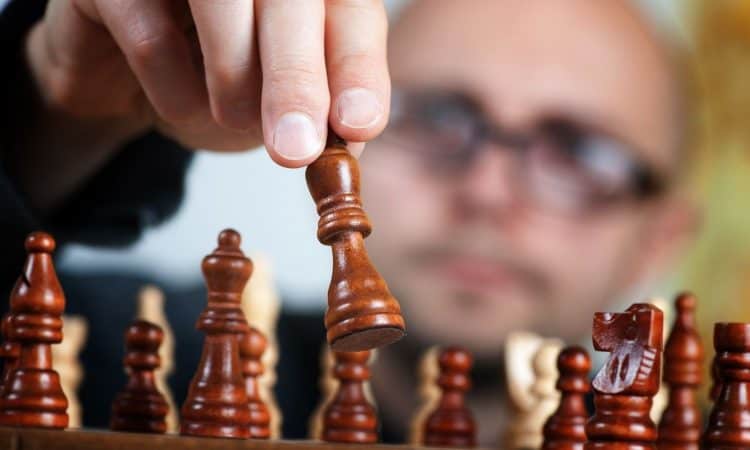Chess is commonly thought of a game only for “smart” people and having a high IQ is a prerequisite for excelling in chess. For many, chess is more than a game. It’s an expression of intellectual prowess and a symbol of intelligence itself. Naturally, this belief has led to the assumption that all grand masters are geniuses with high IQs.
Chess and IQ Scores
In the world of intellectual pursuits, chess holds a distinguished position, with its elite practitioners, the Grandmasters, often looked upon as personifications of brilliance and mental agility. However, the question that piques everyone’s curiosity is – do chess Grandmasters exhibit higher IQ scores than the average person, and if so, is it a factor for their expertise in the game? Let’s delve into some research to find answers.
Do Chess Grandmasters Have a High IQ?
Chess Grandmasters do not need a higher IQ to achieve the title or become good at Chess. There are Grandmasters with a high IQ and Grandmasters with a below-average IQ.
Chess, IQ, and Cognition
Chess, often referred to as “the game of kings,” is a cerebral sport that requires strategic thinking, problem-solving skills, memory, concentration, and the ability to anticipate the opponent’s moves. These factors are also considered in the assessment of an individual’s intelligence quotient (IQ).
There are studies suggest that cognitive abilities, including IQ, are integral to performance in chess, but the link between a Grandmaster’s chess skills and IQ score is more complex than it appears at first glance.
5 Chess Grandmasters That Have a High IQ
While there are a few famous Chess Grandmasters that have high a IQ, there are also others that don’t have high IQs. This means that you don’t necessarily have to have a high IQ to be a chess grandmaster.
1. Magnus Carlsen
In 2009, Magnus Carlsen became the new world chess champion, and he held this title for six years. His peak rating was 2847, the highest in history. His high IQ has been widely documented and he has scored at least a few hundred points higher than the average in standardized tests. He has an IQ of 190. In 2003, he was even invited to take an IQ test at Cambridge University after being recognized as one of Norway’s most exceptional 13-year-old schoolchildren.
2. Sergey Karjakin
In 2016, Sergey Karjakin became the first grandmaster born in the 1990s. He has an IQ of around 160 and is a former chess prodigy. He was a child chess prodigy, and he achieved his first grandmaster norm before the age of 12.
Sergey earned more norms by the time he turned 18 and at 19 he was Russia’s youngest grandmaster. He is currently ranked No. 3 in the world with an elo rating of 2554.
3. Mikhail Tal
Mikhail Tal, or “The Marshall” as he was nicknamed, was one of the best Soviet grandmasters to ever push a pawn. He achieved his first grandmaster norm at age 13 and went on to become one of the leading Russian chess players during the Cold War era.
By 1965, Tal earned his first of three world championships in rapid chess. At times, he was hailed as one of the strongest chess players ever to play the game. Mikhail Tal has an IQ of 175.
4. Gary Kasparov
Garry Kasparov is considered to be one of the most talented, strongest and most creative chess players ever. He was considered a master of strategy, and he played against the world’s top chess players for 20 years. By the 1990s he was recognized as the best chess player in the world, and by 2007, he was considered by many to be the greatest chess player of all time. He’s still considered one of the strongest ever. He has a 190 IQ score.
5. Bobby Fischer
During the late 1960s, Bobby Fischer was arguably the best chess player in the world. He had an amazing record in international competitions, and he won several world championships.
By 1972, he became World Chess Champion after playing a world championship tournament against Boris Spassky in Iceland. Although Fischer declined to defend his title, he continued to play competitive chess up to 1987. He has an IQ score of 181
5 Chess Grandmasters That Have a Low IQ
1. Nigel Short
Nigel Short is a Grandmaster, but he only has an IQ of 110. He came in at No. 3 in the list of chess players with the lowest IQs on record. In 2010, he was one of Europe’s highest-rated chess players and achieved a career rating of 2860, the third-highest ever.
2. Hikaru Nakamura (But Not Really)
Hikaru Nakamura earned his grandmaster title in 2004, and he has since competed in the FIDE World Chess Championship and the Candidates Tournament to name a couple.
He is currently #2 highest ranked player with an elo rating of 2787. He has joked about scoring an IQ of 102 on a test before, but it’s not exactly accurate because he ran out of time in the test. If you listen to him speak for more than two seconds, it’s obvious he’s incredibly smart and has a much higher IQ than 102.
3. Peter Leko
Peter Leko is a Hungarian-born Grandmaster, and he has one of the highest Elo ratings in history. He is one of the youngest grandmasters ever and was awarded the title at age 14. He has an IQ of 125.
4. Vladimir Kramnik
Vladimir Kramnik is undoubtedly one of the best chess players of all time. Throughout his career, he earned several world titles and won a total of 20 championships in different competitions. By 2007, he was ranked the No. 2 player in the world with an elo rating approaching 2800. Kramnik’s IQ score is about 120.
5. Vasyl Ivanchuk
Vasyl Ivanchuk is a Ukrainian Super Grandmaster, and he has been ranked No. 3 in the world by FIDE from October 2008 to January 2010. He has an IQ of 119.
Studies and Findings
- Waters, Gobet, and Leyden’s 2002 study “Visuo-spatial abilities in chess players” explored the link between chess skills and cognitive abilities. They found a moderate correlation between chess rating and intelligence, especially in younger chess players. However, this correlation was not robust for chess Grandmasters, suggesting that other factors might play a more significant role at higher levels of chess mastery.
- In 2006, Bilalić, McLeod, and Gobet conducted a study titled “Does chess need intelligence? – A study with young chess players”. The researchers discovered that the children’s chess abilities initially correlated with their IQ scores, but as they got more skilled in chess, the relationship became less pronounced. This implies that while cognitive abilities may play a role in early stages of learning chess, they become less important as a player becomes more experienced.
- A study from 2007 by Grabner, Stern, and Neubauer called “Individual differences in chess expertise: A psychometric investigation” reported no significant correlation between general intelligence and chess skills for adult tournament players. It suggested that specific cognitive skills, like memory for chess positions and rapid recognition of complex patterns, might be more important for high-level chess performance than a general measure of intelligence like IQ.
- More recently, in 2016, a study by Burgoyne, Sala, Gobet, Macnamara, Campitelli, and Hambrick titled “The relationship between cognitive ability and chess skill: a comprehensive meta-analysis” consolidated results from various studies. The researchers concluded that cognitive ability matters for chess skill, but its importance decreases at higher levels of skill. This is consistent with the “deliberate practice” theory, which posits that attaining high levels of expertise requires extensive training and practice.
Implications and Conclusions
From the research reviewed, it’s evident that the relationship between chess Grandmasters and IQ scores is intricate and not wholly defined by a direct, linear correlation. While intelligence may play a role in early stages of chess mastery, other factors such as specific cognitive skills, experience, and extensive practice appear to be more significant in shaping a chess Grandmaster’s prowess.
However, this does not imply that chess Grandmasters possess average or lower IQ scores. Indeed, the base intelligence required to achieve the level of a chess Grandmaster likely exceeds the average. Chess, being a highly intellectual game, requires cognitive flexibility, strategic planning, and problem-solving abilities that likely correlate with high IQ scores. Yet, the studies demonstrate that a high IQ alone doesn’t guarantee that an individual will become a Grandmaster.
For instance, Gobet and Campitelli’s 2007 study, “The Role of Domain-Specific Practice, Handedness, and Starting Age in Chess,” showed that less intelligent children could reach the same level as more intelligent children in chess ranking if they practiced more. This finding adds weight to the argument that deliberate practice and persistence are critical for high-level expertise in chess.
It’s also worth noting that IQ measures a specific set of cognitive abilities, but it doesn’t cover all types of intelligence. For example, emotional intelligence, creativity, and spatial intelligence aren’t adequately captured by traditional IQ tests. These forms of intelligence could also play a significant role in chess.
Moreover, the research seems to suggest that expertise in chess can contribute to cognitive development. A meta-analysis published by Sala and Gobet in 2016, “Do the benefits of chess instruction transfer to academic and cognitive skills? A meta-analysis,” suggests that chess instruction could lead to a moderate enhancement of students’ mathematical problem-solving abilities and a small improvement in their cognitive skills compared to control groups. These findings indicate that the process of mastering chess could enhance certain cognitive abilities, irrespective of initial IQ levels.
In summary, the relationship between a chess Grandmaster’s prowess and their IQ score is complex. While initial IQ levels can be a significant factor in chess mastery, the role of IQ appears to diminish as the player advances in skill level. Conversely, other factors such as specific cognitive abilities, deliberate practice, experience, and perhaps other unmeasured forms of intelligence, gain importance. These insights offer a fascinating perspective into the intellectual world of chess Grandmasters and underline the nuanced and multifaceted nature of human intelligence.
Final Thoughts
I hope we provided enough examples and evidence throughout this article to dispel one of the more common myths in chess, which is the idea that you need a high IQ to become great at chess is just that, a myth. You do not need an above average IQ to become a grandmaster chess player.
Does it help? Sure it does, you may learn the game and excel at a more rapid rate, but it’s really not something to become concerned and dwell on. If you find yourself dwelling on it, you can always improve your IQ.
I hope this post answered your question on whether or not Grandmasters have a high IQ. If you liked this post, you might also want to read about whether or not Chess requires a high IQ to be good at chess or if a human can beat a computer in Chess.


